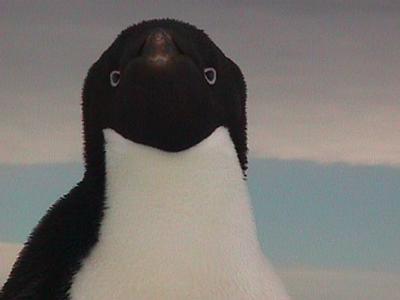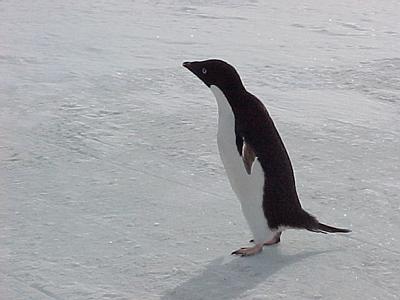13 January, 2000
We are beginning to get a good routine here at Cape Bird. The hut is
very comfortable, especially with the small group staying here. At
present there are five of us. Brent and Leigh are graduate students
working with Springtails, the only insect in this area. Kerry and
Tony are the penguin wranglers that I am helping.
The hut is kind of a combination double wide trailer and mountain
ski touring hut . There are two bunk rooms, a dinning/living area and a
science lab. There is even a shower, though you have to hike a bit down
the hill to get water from the glacier melt water stream. The Cape Bird
hut is run by the Kiwis. I am the only American here, so I am taking a
lot of flack about "yanks" from these blokes. I think I'm even
starting to talk like them, mate.
Karry has spent the last ten field seasons here working with
Adelies. She really knows and understands them well, and is always
willing too explain the finer points of penguin biology to me. The
Adelies themselves are incredibly interesting. Each day I see new
behaviors in the birds. Their body language is very expressive. Each
action has meaning which I am beginning to understand. They are quick
to let us know if they disapprove of something we are doing. Oftentimes
they are very inquisitive and walk right up to us, crane their neck
around and look us over. The parents even bring their chicks right in
next to us. If I lay on the beach, a small group will come over to
examine the strange new animal with bright colors.
Adelies are a great animal to work with; they don't seem to mind us
in the middle of their colony and they can be caught for radio tagging
with a minimum of disturbance. All of the other birds I have ever
worked with would never let you get so close to their nest without
serious distress. Penguins, however, have no natural land predator.
Nothing on land threatens them so they have no reason to fear humans
(unless they have learned recently). This makes it possible to learn a
great deal about their biology with a minimum of effort. Penguins, and
parcticularly Adelie penguins, are the only bird species I can think of
where there are large numbers of flightless birds that can be studied.
This allows for lots of data to be compiled and hence a more accurate
picture of the animalís life and ecology to be developed. The adelie
colony is a perfect natural laboratory.

Adelie penguins are very entertaining to watch. They have a large repertoir of behaviors and vocalizations to communicate with one another. They also are good at letting penguin biologists know if we are bothering them. Normally, they don't seem to mind our presence. They often approach us in a curious manner to get a good look at the new animal on the beach.

Contact the TEA in the field at
.
If you cannot connect through your browser, copy the
TEA's e-mail address in the "To:" line of
your favorite e-mail package.
|
